- Home
- Roxane Gay
Hunger Page 6
Hunger Read online
Page 6
If I had to go to college, and as a Haitian daughter, I had to go to college, I wanted to attend NYU, which had an incredible theater program. Unfortunately, my parents were adamant that it would be too distracting for me to go to college in New York City. And majoring in theater was too unrealistic, too fanciful. The final nail in the coffin of my yearning was their worry that the city was too dangerous, a concern that frustrated me, immeasurably, because I knew where danger really lurked—in the woods behind well-manicured exclusive suburban neighborhoods, at the hands of good boys from good families.
As much as I wanted to attend NYU, what I wanted even more was a break, a chance for all the noise in my head to quiet. I asked my parents if I could take a year off, because I knew I didn’t have it in me to keep up appearances for much longer. I was a mess, barely holding it together, but my request was refused. Taking a year off between high school and college was not what good girls did. It never crossed my mind that I had a choice in the matter once I was told no.
I ended up choosing Yale because they had an incredible theater program and I wanted to work at the Yale Dramat like Jodie Foster had. New Haven was an hour from New York City, so I could spend the weekends in the city, I told myself. It is, of course, a bit strange to feel put upon about having to attend an Ivy League school, one of the best universities in the world, but I was a moody teenager in addition to carrying my secret, my trauma. I was in no position to face my privilege or how I took that privilege for granted.
24
In the fall after I graduated from high school, my parents drove me to New Haven and moved me into my dorm on Old Campus, where all freshmen lived. I was in a fifth-floor walk-up in a quad with three other young women. I met my roommates, nice enough girls I would get along well with. My dad bought me a small blue love seat for the common room that he and another father hauled up those five flights. My mom made my bed with brand-new sheets and helped me unpack. We went out to dinner before they headed to Nebraska, where they were moving once again. It all seemed very normal. Before we parted, they wished me luck and encouraged me to work on my problem, my weight of course, and then I was on my own once more.
I have no doubt my parents were afraid to leave me at another school. The last time they did that, I gained a massive amount of weight. I’m sure they were terrified of what would happen in college, of how much bigger I could get. They didn’t worry about drinking or drugs because they already knew my chosen vice. Still, they believed in the importance of education, and I think they hoped that I had some sense of self-preservation, that I would embrace the opportunity I was being given and would want to lose weight so I could be more like other girls, so I could be smaller and therefore better.
Having attended boarding school, living on campus for the first two years, I didn’t have any of the typical growing pains associated with going to college. I knew how to take care of myself on a campus, or at least how to make it seem like I was taking care of myself.
But I struggled, a lot more than I had in high school. I had acquaintances but no one with whom I felt I could be honest about myself. I was unraveling so much more because there was far less supervision. There were far more temptations and ways to spend my time. New Haven, Connecticut, is a very different city from Exeter, New Hampshire, much bigger, urban, with a diverse population. There was so much more food available to me, both on and off campus—I loved going to Atticus, part bookstore, part café, with delicious salads and sandwiches. I rarely went to class, and when I was in class, little made sense. A biology teacher informed us that it was his mission to weed out the wannabes from the students who were destined to become doctors. I was weeded out, quite efficiently, because the workload was outrageously demanding. There were labs and homework and lab reports to be written according to very strict guidelines. In Calculus III, the math was so complex, so esoteric, it was almost amusing. The professor may as well have been speaking another language.
I changed my major three times in two years, from premed and biology to architecture to English. Meanwhile, I spent most of my time doing theater, as I had in high school. I never tired of being responsible for the quiet choices behind the scenes that make the theatrical spectacle work.
My days and nights were spent backstage at the Yale Dramat and in the theaters of the colleges (or dorms, anywhere else) across campus. I built sets and painted flats and ran soundboards and hung lights. One time, I accompanied a faculty adviser to a private school in Massachusetts to procure a chain-link fence that we’d use during the final scenes of West Side Story. I designed the set for a small college production and served as a technical director for a show in the experimental theater. I was able to forget about school, about my family, about my misery, when I worked on shows. When I was backstage or in the set shop or up on the catwalk, there were things that needed to be done and I knew how to do them. Being useful was a balm.
25
That summer when I was nineteen years old marked the beginning of my lost years, and my lost years began with the Internet. When my sophomore year ended, I moved into an apartment above a small specialty grocer with an acquaintance. We weren’t especially close, but at the outset, we were friendly enough to believe we could live together.
When I started college, my parents gave me a computer, a Macintosh LC II and a modem. The computer and modem were, purportedly, to help me with my studies, but really, I used them to chat with strangers all around the world on bulletin boards and in chat rooms and on IRC, an old-school chat program with thousands of channels populated by thousands of lonely people who were mostly interested in talking dirty to one another.
I spent most of my waking hours online, talking to strangers. I didn’t have to be the fat, friendless loser who couldn’t sleep, which is how I saw myself. I became immersed in the anonymity, and in the ability to present myself to others as I saw fit. I lost myself in feeling connected to other people for the first time in seven years. Being online offered a very particular and desperately needed thrill.
Throughout high school, I had no romantic life to speak of. I was too awkward, too shy, too much of a mess to date. I was invisible to the boys at my high school because of my blackness, because of my size, because of my complete indifference toward my appearance. Because I read so much, I was a romantic in my heart of hearts, but my desire to be part of a romantic story was a very intellectual, detached one. I liked the idea of a boy asking me out, taking me on a date, kissing me, but I did not want to actually be alone with a boy, because a boy could hurt me.
The men I talked to online allowed me to enjoy the idea of romance and love and lust and sex while keeping my body safe. I could pretend to be thin and sexy and confident.
I discovered forums for rape and sexual abuse survivors, where, as with when I read The Courage to Heal, I saw that I was not alone. In those online forums, I saw that horrible things happened to so many girls and sometimes boys. I saw that however bad my secret was, many people had far worse secrets.
In IRC chat rooms, I talked to people in the BDSM community, and I learned about safe, sane, and consensual sexual encounters, where power was exchanged, but you could have a safe word to make things stop when you wanted them to stop. I learned that there were people who would take the right kind of no as no, and that was powerful, intoxicating. I wanted to know so much more about safe ways to say no.
I had a more expansive vocabulary, now, for what happened in the woods. At twelve years old, I had no such words. I just knew that these boys had forced me to have sex with them, had used my body in ways I did not know a girl body could be used. Thanks to books and therapy and my new friends online, I knew ever more clearly that there was a thing called rape. I knew that when a woman said no, men were supposed to listen and stop what they were doing. I knew that it wasn’t my fault that I had been raped. There was a quiet thrill to having this new vocabulary, but in many ways, I did not feel like that vocabulary could apply to me. I was too damaged, too weak to deserve absolu
tion. It was not as easy to believe these truths as it was to know them.
26
A couple weeks before my junior year was supposed to begin, I disappeared. I told no one where I was going, not my roommate, who was increasingly and justifiably fed up with my erratic behavior, or my acquaintances, or even my parents. I flew to San Francisco because I had met a man in his forties on an online bulletin board and we had mutual . . . interests. For the first time in my life, I felt wanted, and though I felt no real desire for this man, being wanted was enough. I put my body in danger even though I knew better, but I wanted nothing more than to leave my life as I knew it. I grabbed at my only way out.
For all the trouble I’ve known, I have also been very lucky. This older man was strange but kind. He never hurt me. He never forced me to do anything I did not want to do. He looked out for me and introduced me to other strange but kind people who accepted me as I was—young, lost, and a complete fucking wreck—without taking advantage of me. We went to San Francisco to attend some parties, where I met many of the people I had been chatting with online for months. After a raucous time, he invited me to follow him to Scottsdale, Arizona, a suburb of Phoenix, where he lived. I didn’t want to return to my life. I couldn’t. So I didn’t.
I had no money, only a few days’ worth of clothing. No one who loved me knew where I was. I was thrilled. I felt free because I didn’t have to pretend to be the good Ivy League girl anymore for my parents or anyone else.
I spent nearly a year in Phoenix. I lost my mind and I didn’t even try to pull the pieces of myself back together. I just did whatever I wanted. I did the kinds of things that the good girl I had long pretended to be would never dream of doing. There was no more pretending I was a straight-A student or a girl who cared about grades or a good daughter or a good anything. Completely unmoored from my previous life, I could be a blank slate. I could reinvent myself. I could take the kinds of risks that would have, not long before, been unthinkable. I could complete the break that had long been growing between me and my family and everything I had ever known.
I worked the graveyard shift at a phone sex company in downtown Phoenix with a bunch of other lost girls. I mostly sat in my booth and did crossword puzzles while I talked to lonely men who wanted nothing more than the fantasy of a woman who might listen to them for ten minutes or an hour or two. Around four in the morning, on our lunch break, we would get food, greasy terrible food, from a Jack in the Box across the street. I was fat and I continued to eat to get fatter and I talked to men without having to be touched by men. When my shift was over, I went home and sometimes invited my coworkers over, and we sat around the pool at this man’s house, sleeping with our sunglasses on as the Arizona sun burned into our skin.
One day the man who brought me to Arizona taught me to shoot a gun with wax bullets. It was exhilarating, holding a gun in my hand, the power of pulling the trigger, even if the bullets only hit an inanimate target with a quiet splat. I thought about turning the gun on the boys who had hurt me. I thought about turning the gun on myself.
Most of the choices I made during my lost year were ill advised. I was reckless. I did not care about my body because my body was nothing. I let men, mostly, do terrible things to my body. I let them hurt me because I had already been hurt and so, really, I was looking for someone to finish what had already been started.
Bottomless. Fearless. This is the reputation I developed in my social circle. One of those things was true.
I went home with strangers. One man invited me over while his wife slept on the floor next to the bed where we lay. His floor was covered in cat litter. I can still remember the crunch of it beneath my bare feet as I snuck out the next morning, walked to a pay phone, and called the man I lived with to come get me. I started dating women because I naïvely thought that with women, I might be safe. I thought women would be easier to understand.
For a couple of months, I lived with the man, and later, I got an apartment with a couple who would end up taking my share of the rent money and never paying the rent. When we were evicted, rather abruptly, a few months after I’d moved in, I was the only one who was shocked.
My parents eventually found me with the help, I assume, of a private investigator. I have never asked. They had my brother Michael Jr. call me, somehow knowing I would not hang up on him, the baby of the family. We reconnected, tentatively. I learned that my father had gone to New Haven and packed up my apartment, made what amends he could with the roommate I had left in the lurch so irresponsibly. Once we reconnected, my dad shipped me some of my stuff. He paid my outstanding bills. He fathered me despite everything I was doing to be unparented.
And then it all ended. I came home to an eviction notice on my apartment door. The couple I was living with was frantically packing all their belongings as if everything were just fine. I panicked because I had, in my still relatively sheltered and privileged life, never known such a thing. As I cried and freaked out, I packed my stuff into a trunk and left it with a friend. I considered my options but didn’t want to go home. I wasn’t ready. With what money I had, I bought a plane ticket to Minneapolis. I went to Minnesota, in the dead of winter, to stay with a girl I met on the Internet. This would become a pattern—meeting lovers online. At first, I did it because it felt safer and I could be sexual without having to actually be sexual. Then, as I got fatter, it was a way to meet people and hopefully charm them with personality before having to show them the truth of my big body. I thought the girl in Minnesota was the love of my life. This would also become a pattern. Two weeks later, I realized she wasn’t the love of my life. She was a stranger and I had nothing, no money, nowhere to live, no job. I broke down and called my parents. My father told me to go to the Minneapolis airport and I did and there was a plane ticket waiting for me. Again, he fathered me.
Though they did not have to, though they were frantic with worry, my parents welcomed me home. They had questions and anger and hurt and I couldn’t do much about any of that. I could not tell them the truth. I could not explain why I continued to gain so much weight. I could not figure out how to be less of a disappointment. And still, I knew I had a home to return to, a home where I would be welcomed and loved.
I was still a mess. I spent a lot of time in my room, on my computer, tying up the phone line with my modem, which did not go over well with the rest of my family. It was easier to lose myself in the virtual world than to try and put my life back together or face these people who thought they knew me. I was still broken and I liked how it felt to simply accept that everything was wrong and couldn’t be set right. It felt good to not try and pretend.
27
After several tense months of living at home in Omaha, I moved to Lincoln, about fifty miles away. I wanted my independence and my “space” and to feel like an adult even though I was so far from being an adult. I was twenty years old and I felt like I was twelve years old and I felt like I was twenty years old and I felt like I was a hundred years old. I knew nothing but thought I knew everything.
The apartment, subsidized by my parents of course, was a one-bedroom with a tiny kitchen and a balcony, where I smoked with continued enthusiasm.
I went to my parents’ house often, and I would stock up on toilet paper and groceries from my mother’s pantry. Things were still fractured between us, but I knew, as always, that I had a home. I had a very well-financed crack-up. I did not go hungry even as I hungered for so much.
To at least try to support myself, I held a series of odd jobs—adult video store clerk, telemarketer, Gallup poll taker, loan consolidator at a student loan company—and quickly realized that without a college degree I was only ever going to work odd jobs for minimum wage. I was readmitted to Yale, but the thought of returning to New Haven was unbearable. I turned twenty-one and celebrated by buying a six-pack of Corona even though I hate the taste and stink of beer. Later that night, a woman I was casually dating called, and when I mentioned it was my birthday and I was sitting alone
in my apartment, with a sweaty six-pack of cheap beer, she offered to show me a good time. I don’t even remember what we did. I had no friends. I ended up finishing my degree through a brief residency program at Vermont College, which was, at the time, part of Norwich University—a military college in Vermont. I wrote and wrote and wrote.
I very much wanted to be a writer, so I enrolled in the MA program in creative writing at the University of Nebraska–Lincoln. I worked at night and went to school during the day. I was broke all the time, which is not to be confused with being poor. I had a safety net and I knew I had a safety net, and though there were many days I was fueled by ramen, still I did not go hungry while I hungered. I rarely slept because it was in sleep that I was forced to confront myself, my past. I was tormented by terrible dreams, memories really, of those boys, the woods, my body at their lack of mercy.
At the university, I went to classes and learned about Victorian literature and cultural theory and postcolonialism and I sat in workshops with students who were surprisingly generous in their feedback about my writing, given common wisdom about writing workshops. I served as an editorial assistant for Prairie Schooner, the program’s literary magazine, and was mostly relegated to opening all the incoming mail—hundreds of submissions a week from writers like me who just wanted to be discovered. It was there that I learned that one of the best ways to measure where you stand as a writer is to work at a literary magazine. We received all manner of submissions. People sent in diaries, odes to their cats, entire novels or books of poetry, all carefully printed out and stuffed into manila envelopes. There were many submissions from prisoners who were just as lonely as I was, who had found their voices in their prison cells and wanted their voices to be heard. I pored over the cover letters from all these writers who would share seemingly anything about their lives.

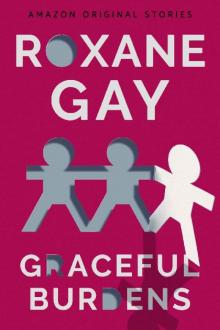 Graceful Burdens (Out of Line collection)
Graceful Burdens (Out of Line collection)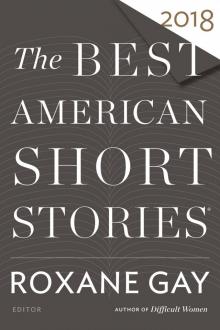 The Best American Short Stories 2018
The Best American Short Stories 2018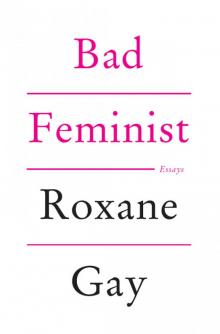 Bad Feminist
Bad Feminist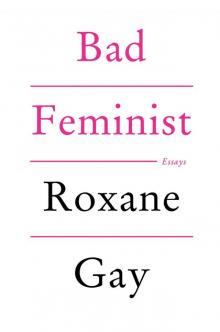 Bad Feminist: Essays
Bad Feminist: Essays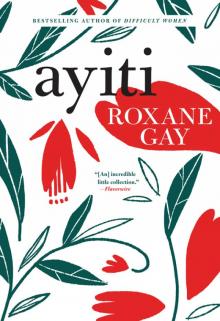 Ayiti
Ayiti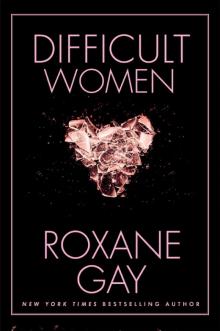 Difficult Women
Difficult Women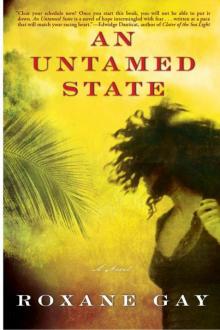 An Untamed State
An Untamed State Hunger
Hunger